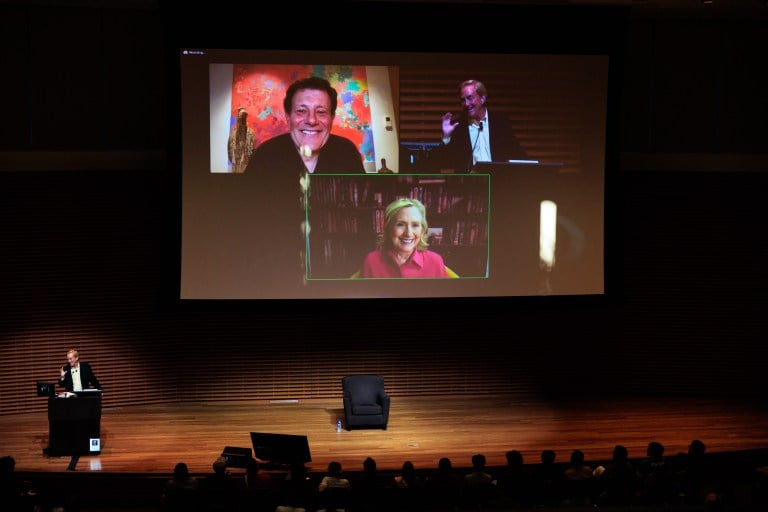U.S. Secretary of State Hillary Clinton and journalist Nicholas Kristof shared their insights on democracy, foreign policy, child advocacy and media and technology in a wide-ranging guest lecture for POL 61: “Politics 2022: America at a Crossroads” Monday night.
“This is the most perilous time [for democracy] in your life or mine,” Clinton said over Zoom to an audience of over 500 students gathered in CEMEX auditorium.
Taking place against the backdrop of a myriad of domestic and global issues, ranging from disinformation to the Russian invasion of Ukraine, this class aims to tackle contemporary issues at a time of great uncertainty. Students cited the course’s deep bench of expert speakers, ranging from senators to chief operating officers, as a major draw for their enrollment.
“It’s easy to feel helpless in today’s political climate as a young person,” said Alina Davinson ’25. “I was immediately interested in gaining insight from a diverse group of leaders on current issues.”
Lena McEarhern ’25 added that the course is an opportunity to “stay up to date on current events leading into this year’s midterm elections.”
The course is taught by Jim Steyer, an adjunct professor in the Graduate School of Business and founder of Common Sense Media. He told The Daily he hopes the class will shape the way that Stanford students approach the unusual domestic and international challenges they are inheriting.
“It is an absolutely critical time in American democracy,” he said. “I teach to motivate young people to change the world.”
Monday’s discussion with Clinton and Kristoff was separated into four segments: democracy at home, democracy abroad, media and technology, and the state of kids in America.
Democracy at home
The first subject the speakers addressed was what they described as the concerning state of American democracy. Both spoke about demagoguery and the danger of worsening partisan divisions.
Clinton told the class that she was “deeply worried that the stresses on [American] systems,” citing deepening racial and cultural tensions with what she described as demagoguery as their root.
Kristof said American democracy is experiencing its “most dangerous period since the civil war. He said Americans have “lost any sense of shared facts” and become “open to demagogues.”
Clinton said when she was a senator, she “could reach across the aisle because there were people who were reaching back.” She said she was able to find common ground and, while this usually meant neither party getting everything they wanted, they were able to pass legislation.
Now, she said, she doesn’t “recognize the people who are still there.” Most of the people who were usually willing to cooperate across party lines have retired or been defeated, she explained. She sees the current Republican party as acting “more like a cult than a big tent where people have certain views that bring them together, but they have independence of thought.”
But though both used strong language to describe leadership, Kristof condemned the tendency to classify all Trump voters as racists and bigots, and he told the class that such generalizations are counterproductive.
Democracy abroad
For the “democracy abroad” portion of the conversation, the speakers tackled the rise of authoritarian leaders, including Russian President Vladimir Putin and Chinese president Xi Jinping.
Clinton, an expert in foreign policy and someone whose life trajectory has been influenced heavily by the Russian government, told the class that Putin “really, truly believes he has a messianic mission to rule over as much of greater Russia as he can.
“If you think Putin will be happy with Ukraine, you’ve not been paying attention,” she said.
Kristof, whose international expertise lies more in China and India, added that the international community’s response to Russia sends a message to Xi Jinping to not invade Taiwan.
Media and technology
With several upcoming speakers being journalists or tech CEOs, the speakers addressed the role of media institutions and big tech in the deterioration of American democracy.
Kristof said that technology “exacerbates the challenges” of inequity that are currently “undermining [American] legitimacy, influence, and power.” While he said he once believed social media would nurture higher levels of accountability, he now views it as a place that poisons politics.
He said he wants to see “a broader effort to hold organizations like Fox News accountable” for spreading dangerous information.
Though Clinton said she believes the benefits of technology still outweigh the problems, said the threats posed by technology are significant. She also called for tougher regulation and stressed for the public to call for legislation.
Kids in America
As career-long child advocates, the speakers concluded the class by discussing the damning effects of childhood inequality on several political issues.
“Children’s well-being is dramatically influenced by inequality,” Clinton told the class. “You cannot look at any problem we have for more than a nanosecond and not conclude that at the root of so many of them is this horrible crime against so many of our children being in so many ways being blocked from their full potential, literally from birth forward.”
Kristof also acknowledged the inequalities but added that students have the power to make change by voting and investing in children.
Clinton also urged students to take their future into their own hands.“We cannot allow people to take away the opportunities you should be inheriting, to charge your own life, to make your own decisions, to stand up for what you believe in, but we’re going to need everyone to feel that way and everyone to sign up for it,” Clinton said.
She added, “Don’t take your freedom, rights, and democracy for granted.”
